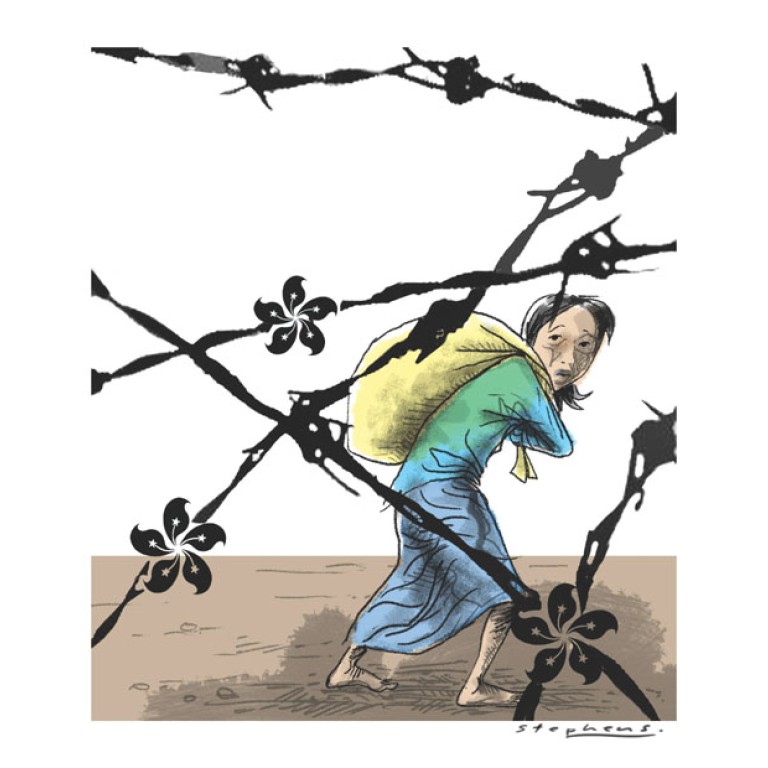
Rich Hong Kong can't turn its back on the few refugees on its shores
Aideen McLaughlin says our city of means can easily do more for the destitute and often abused refugees who have found their way to Hong Kong, wishing only to survive
For one hour last week, I was Zaara Schenoude, a 36-year-old Middle Eastern factory worker. My hometown was being destroyed by sectarian violence, wreaking havoc on my people, and I was forced to flee under armed guard, herded with 80 others to a refugee camp across the border. Apart from my ID card, jewellery and headscarf, I had no belongings, no money and no choice.
Along the way, I became separated from my family. I was caught in gunfire and interrogated and intimidated by armed soldiers who were supposed to protect me.
I traded my wedding ring at the border just to get across and my watch at the camp to get food and water. I was ordered to keep my hair covered at all times and wasn't allowed to speak to any of the men. I constantly kept my eyes to the floor, afraid of drawing attention to myself. I felt powerless, humiliated, frightened, alone.
I huddled in a tent in the blistering heat, cheek-by-jowl with nine others, each jostling for a small space to call our own. From there, I was handpicked by the camp guards and taken to a room where they checked my mouth to see if I was healthy, then threatened to rape me. If I refused to cooperate, they said they would kill me … and then it was over.
This was my experience of participating in a live simulation organised by the Hong Kong charity Crossroads Foundation to try to give people some insight into what it might be like to be a refugee.
According to one refugee who had previously participated in the simulation, what we experienced was just 15 per cent of what they went through every day. I did it for just one hour and it was one of the most intense episodes of my life.
But, at the end, I was able to walk away and go home. All that stayed with me was a bad headache and the knowledge that this would never be me.
But would it never be me? Or you, for that matter? For all that really stands between you and me and a "real" refugee is circumstance.
Refugees are ordinary people caught up in extraordinary situations beyond their control. They had lives and professions and families, like us. They had hopes and dreams and expectations. They probably thought, "it will never be me" - until it was.
Today is United Nations World Refugee Day, a day of commemoration when communities around the world come together to reflect on what it means to be a refugee and to celebrate refugees' contributions to our societies. In many places around the globe, the festivities extend to a week. But for refugees in Hong Kong, there's not a lot to celebrate.
Hong Kong does not recognise refugees. That is despite the fact that this city was built on the contributions of refugees, made by the thousands of people who fled across the border from the Cultural Revolution and civil war on the mainland, seeking protection in the nearest safe place.
For those refugees today who survive long enough to get here, they are forced to subsist on bags of food handed out by the government equivalent to HK$40 a day; that's HK$13 for each meal. They get HK$1,500 per month towards rent, so low that it forces many to live on the margins in rundown settlements that can hardly qualify as housing.
I have met families literally living in pig sties, trying to get clean water by filtering it through a sock; people kept on the brink of destitution in an attempt to deter others like them from coming.
But still they come. Why? Because they have no choice. Today, around 500 ordinary people will have no choice but to flee Ukraine; 500,000 people have had no choice but to escape from Mosul in Iraq since the weekend; and tens of thousands have been forced to flee Syria this past month.
There are currently around 15.4 million refugees in the world. Eighty per cent of them are hosted by poorer nations, not rich places like Hong Kong. There are only about 8,000 people seeking protection here; that's just 0.1 per cent of the Hong Kong population.
In comparison to most other countries, the numbers who make it to our city are small. And yet Hong Kong does not offer them any chance of long-term protection. Surely we can do better?
